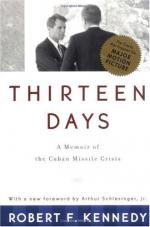
|
| Name: _________________________ | Period: ___________________ |
This test consists of 15 multiple choice questions and 5 short answer questions.
Multiple Choice Questions
1. What was Robert's main argument against a surprise attack?
(a) Cowardice of surprise.
(b) America's traditions and history.
(c) Christian morality.
(d) Ineffectiveness of attack.
2. What did Robert suggest JFK do on September 4th regarding the possibility of Russia placing missiles in Cuba?
(a) Issue a statement that it would not be tolerated.
(b) Bomb Cuba.
(c) Threaten Soviet Chairman Nikita Khrushchev.
(d) Issue a statement of good will.
3. Who was U Thant?
(a) Acting Secretary General of the United Nations.
(b) Secretary of Defense.
(c) Soviet Ambassador to the United Nations.
(d) Soviet Chairman.
4. What did JFK order into the air at all times until the crisis was over?
(a) B-52 bombers with atomic weapons.
(b) U-2's to take photographs.
(c) Nothing, all of the action was at sea for the blockade.
(d) Helicopters with anti-missile equipment.
5. What book had JFK recently read that had to do with miscalculations leading to war?
(a) The Dangerous Summer.
(b) The Guns of August.
(c) Night.
(d) The Rise and Fall of the Third Reich.
6. What did JFK ask in a letter to Khrushchev after ordering the blockade?
(a) For Khrushchev to observe the quarantine.
(b) All shipes to turn back.
(c) For Khrushchev to leave Berlin out of their deliberations.
(d) All missiles to be handed over.
7. In the section entitled, "It was now up to one single man," when did JFK hope to broadcast his plan to the nation?
(a) Tuesday.
(b) Never.
(c) Monday.
(d) Sunday.
8. Robert describes the conflict in Cuba as one between two atomic nations. What are the two atomic nations he refers to?
(a) US and USSR.
(b) US and Germany.
(c) Berlin and Cuba.
(d) US and Cuba.
9. Against what strategy was the following argument used: It would be like "closing the door after the horse has left the barn" (28)?
(a) Nuclear War.
(b) Blockade.
(c) Air stike.
(d) Summit.
10. Before the announcement could be made that there was a Cuban Missile Crisis, what did the press report on instead of the crisis?
(a) The secret meetings of Ex Comm.
(b) The OAS meeting.
(c) The normal news.
(d) The President would make a speech.
11. Who told Ambassador Dobrynin about the President's intended speech?
(a) Dean Acheson.
(b) Secretary Rusk.
(c) Adlai Stevenson.
(d) Robert Kennedy.
12. Why did JFK change the line of interception for the blockade?
(a) To buy time.
(b) For safety.
(c) To show force.
(d) To tighten the line.
13. Who suggested that the US take military action against Cuba for America's safety, not knowing about the missiles?
(a) Senator Richard B. Russell.
(b) Senator Robert F. Kennedy.
(c) Senator Homer E. Caphart.
(d) Senator J. William Fulbright.
14. What position did Robert hold in the Kennedy administration?
(a) Senator.
(b) Attorney General.
(c) Secretary of Defense.
(d) Press Secretary.
15. Who said, "they, no more than we, can let these things go by without doing something. They can't after all their statements, permit us to take out their missiles, kill a lot of Russians, and then do nothing. If they don't take action in Cuba, they certainly will in Berlin" (28)?
(a) General LeMay.
(b) Robert F. Kennedy.
(c) John F. Kennedy.
(d) General Shoup.
Short Answer Questions
1. Who wrote the note saying, "I now know how Tojo felt when he was planning Pearl Harbor" (24)?
2. How far was the original line of interception for the blockade?
3. According to Robert in the section, "It was now up to one single man," what did JFK stress in his speech to the nation?
4. What did Robert sarcastically claim to be the advantage to being wrong in the case of military action?
5. Who publicly confronted Soviet Union Ambassador V. A. Zorin?
|
This section contains 634 words (approx. 3 pages at 300 words per page) |

|




